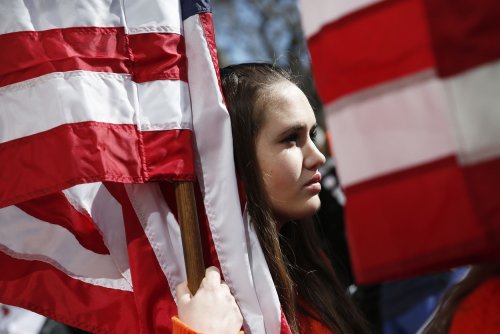WASHINGTON -- Labor leaders and key Democrats denounced the new North American Free Trade Agreement Wednesday, contending the pact the Bush administration claims will create U.S. jobs could turn U.S. industrial centers into 'ghost towns.'
President Bush, battling to stay in the White House as Election Day looms three months away, summoned reporters to the Rose Garden Wednesday morning to announce completion of the politically sensitive trade talks between the United States, Mexico and Canada.
The North American Free Trade Agreement -- which will phase out all tariffs between the three nations -- will be worked out by lawyers in coming weeks. The pact must still be ratified by Congress, and by lawmakers in Mexico and Canada.
Bush said the trade pact -- hammered out in 14 months of negotiations -- will expand markets for U.S. goods, creating jobs and stimulating economic growth.Supporters of Bush and the trade pact agree with that assessment.
'Our first impression is that this is an extraordinarily good agreement that will yield more export and investment opportunities, improved market access and better protection for intellectual property as well as the environment,' said Howard Lewis, vice president of the National Association of Manufacturers.
But critics say the trade agreement will cost U.S. workers their jobs as U.S. companies relocate factories to take advantage of lower labor costs across the border. Goods made in Mexico and Canada will flow freely into the United States, they say, while U.S. consumers snap them up and pass over higher-priced U.S.-made products.
'The administration is on the wrong track with this agreement,' said Rep. David Bonior, D-Mich., the party's House whip. 'We need to fight it. We don't want to let jobs become our No. 1 export.'
House Ways and Means Committee Chairman Dan Rostenkowski, D-Ill., urged election-year politics be set aside and called for careful examination of the draft agreement.
'My decision on supporting this agreement will depend not only on whether the terms of the agreement serve American economic interests, but also on whether adequate protections for the environment and workers' rights are provided.
'I will not embrace any proposal that does not fully address these important concerns. I urge my colleagues to reserve judgment until they read the entire draft and the administration has an opportunity to explain the details,' Rostenkowski said.
Democratic presidential nominee Bill Clinton said he will review the agreement.
'From the outset of this campaign, I have stated that I will support a free trade agreement with Mexico so long as it provides adequate protection for workers, farmers and the environment on both sides of the border,' Clinton said.
William Bywater, vice president of the AFL-CIO, said that, at a glance, the pact looks bad for American labor.
The agreement 'will send the unemployment rate in the United States soaring to an all-time high and will turn industrial communities into ghost towns by sending good-paying jobs to Mexico,' Bywater said in a statement.
But the Heritage Foundation, a conservative think tank in Washington, said the pact will allow U.S. companies to become more competitive by taking advantage of reduced duties as well as lower labor costs in Mexico.
Bush said the pact will make the North American marketplace more competitive, tossing U.S. businesses the challenge to rise and beat foreign rivals.
Trade Representative Carla Hills, who negotiated the pact with Mexican and Canadian counterparts, said the competition fostered by NAFTA would generate high-paying, skilled jobs.
Analysts explain that inexpensive, low-technology imports could be used by U.S. manufacturers to make high-tech goods.
Sen. Don Riegle, D-Mich., whose state has a 9.4 percent unemployment rate, lambasted the agreement as 'a jobs program for Mexico.'
'The main export we are going to have to Mexico is American jobs,' Riegle said.
The AFL-CIO said if U.S. investors move plants to Mexico to take advantage of 'cheap wages and poor working conditions' in producing goods for the U.S. market, American laborers will be hurt -- by over-the- border job flight and displacement of families.














